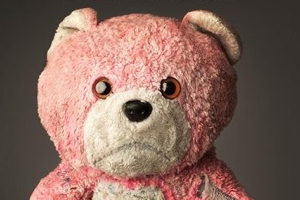Another brilliant piece from a GUNNAS WRITING MASTERCLASS writer
Thadius was a dirty old man with a penchant for cheap tobacco and three-limbed teddy bears. He lived alone – obviously – whiling away his days working on his back under a 1930s Ford tractor. “Just tricking it up”, he’d mutter to himself with spanner in hand and the radio crackling. Of an evening, he’d trot in to town to work the petrol bowser for a few hours at the local Stop n’ Go. Thadius preferred the bowser to being inside behind the counter. Less conversation out front and more chance of finding some dropped, forgotten object. Out front was where sleepy kids were dragged from the back seats of station wagons in their dressing gowns and plonked on the badly-lit toilets whining “Muuuuummm!!! I don’t need to go”, as Mum barked back, “Just go! This is your last chance. We’re not stopping again”. And with all that going on behind him, Thadius would be collecting the strewn blanket, the slipper, or the occasional and much-coveted furry friend. As the family members returned to the car with milkshakes and chocolate bars and sausage rolls either limp or rock-hard depending on the time of day, he’d make a choice about the fallen-out items – whether to hand them back or hide them in his stash in the small bucket next to the bin. The bucket was not marked for rubbish.
If he’d felt like sharing it with you, or speaking at all, Thadius could tell you that the biggest treasures did not come from the wealthy cars that had four matching hub caps. In these cars, and these families, toys were replaced every six months – quite long enough to endure the gathered-up germs and just the right amount of time to get slightly bored as the next generation of plaything burst onto ad breaks and store shelves at three-foot high eye level. No, for Thadius, the scores were to be had from the low to middle-income families wedged into a monthly and weekly and daily budget that did not allow for the replacement of toys. In these families, kids fought doggedly with their parents to cling to the matted, soiled, one-eyed bears with a foot or an arm missing. The bear that had been with them when their baby teeth went to heaven, when their first nightmares wrenched them screaming from sleep, and plonked alongside them through the transitions from home to kinder and kinder to school. These little soft tale-carrying troopers of childhood bought out the real spirit of a kid as they screamed and willed their parents to die at the very suggestion of washing Mr Jack or Froggles or Judy the Panda. For these kids were like hawks about their bears and they knew that when teddies went for a ride in the washing machine, particularly at night, they never EVER came back. These kinds of teddy bears only ever fell out of grasp in the drunken-petrol-daze of a long car trip, under the glare of a fluorescent street lamp and the gaze of the dirty old man.
He hoped to do something with all these broken, asymmetric objects one day soon and before he carked it. In all their furry dismemberment there was a uniformity, a collectiveness. No ice-cream smudged, clunky-headed Cabbage Patch Kids looking like Miley Cyrus on-crack sat amongst his shelves. They formed something of a family these stolen, aggrieved best friends of six-year-olds. But he didn’t want to show them to anyone, or to fondle them or fantasise about them. Nothing as crude as that. For him, there was something heart-wrenchingly poignant in the spirit of these bears that kids had whispered the words of their woes to. In all the stories of childhood, kids rarely get to do the telling.
But no one had ever asked Tad about the bears, and even if they had, they might not have heard him tell it well. Tad wasn’t a loud talker. And because of that, people mistook him for being shy and slow-witted and did not tend to say much of anything interesting to him or enquire much at all into the way of his world. And because of that, Tad would often say “Thank a good goat’s fuck” that he’d avoided another mundane conversation as he turned away from the mum or the dad and back to replace the nozzle in the bowser. And this is why some considered him a dirty old man. They thought his reference to a farm animal copulating inferred something more. At least his wife did last summer when she finally discovered his teddy bear stash – incorrectly putting two-and-two together. Once her pupils had returned to a manageable size in her eyes, she’d spun to him, spat in his face, and walked off the property. He didn’t care, the old hag hadn’t said anything interesting in 42 years. He did wonder though, lying on his bad old back, under his rusty old tractor, if he would ever tell anyone anything new or surprising ever again. And as he wondered, he looked over at the shelves of bears leant untoward and one-eyed watching the dirty old man from the servo.












